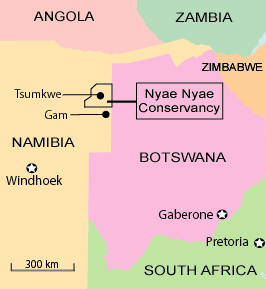Schools in the Nyae Nyae Conservancy are having a variety of troubles, according to an article last week in the New Era, a newspaper published in Namibia. The Ju/’hoansi founded schools in Tsumkwe, the major town in their territory, to provide an education in their own language for children grades one through three.
 Cwisa Cwi, principal of the Nyae Nyae school system, told the newspaper that Ju/’hoansi parents support the schools in principle but they expect the teachers to handle all disciplinary matters themselves. He said that parents often do not insist that their children attend school, so there is a high drop out rate. He also complained that many parents do not become involved with school activities such as the school feeding programs or story-telling activities.
Cwisa Cwi, principal of the Nyae Nyae school system, told the newspaper that Ju/’hoansi parents support the schools in principle but they expect the teachers to handle all disciplinary matters themselves. He said that parents often do not insist that their children attend school, so there is a high drop out rate. He also complained that many parents do not become involved with school activities such as the school feeding programs or story-telling activities.
“San learners are progressing from grade to grade without sufficient skills, knowledge or conceptual understanding resulting in ever-increasing backlogs and an inability to achieve the grade level objective,” he told the press.
There are other problems in the Tsumkwe schools. Children are learning their own San language inadequately. Furthermore, the schools lack enough books, the children do not attend school consistently, and many enroll who are unready for basic instruction.
Some of the teachers are trying to improve their teaching skills, but many are transferring out to other jobs because they are discouraged with the situation in Tsumkwe. The teachers have to make do with very difficult living conditions. Some have to live in tents due to a lack of housing. It is difficult for some teachers to find transportation to and from their school buildings. Many of the teachers are young people who are otherwise unqualified to teach. They are employed with the understanding that they will enroll in in-service training programs in order to become fully qualified teachers.
The teachers are demoralized because many parents lack interest in the schooling of their children. Due to all the problems, schools in Tsumkwe were closed 46 days out of the school year 2010. A third of all the students dropped out that year, two-thirds of whom were in the first grade.
The six schools in Tsumkwe were established in 1993, but they were subsequently taken over by the national Ministry of Education. Mr. Cwi, as of 2004, was one of the few San young people to achieve 12 grades of education and perhaps the first to then get a teaching certificate from the Windhoek Teachers College.
Obviously an achiever, Mr. Cwi was quoted at the time as saying, “I always wanted to reach some heights. I wanted to drive a vehicle of my own, and I wanted to live a decent life, to be self-dependent like other educated people. And I knew education was the way.” It appears from the news story last week as if his ideal is not widely shared by the Ju/’hoansi.